QuestionQUESTION: Hi Labman,
Fantastic forum by the way, lots of useful hints and tips.
We recently bought a 10 week old male chihuahua called Pepe. We bought him tree days ago. We started with newspaper on the floor, and have had minimal success. He has been doing his business here, there and everywhere. We are concerned because we want to set him us a regime so we can roughly time his toilet breaks. We have no set feeding pattern, are we supposed to take the food away after a certain time?
I would really appreciate some guidance,
Thankyou!
C x
ANSWER: Yes, regular feeding times help regulate the timing of bowel movements. Put down the dish with what the dog should eat, and give it 15 minutes to eat. Then take it up. Do not give it anything to eat until its next scheduled meal. Often failure to clean up its food means you are feeding too much. Your dog definitely should be narrower at the waist than the hips and chest. You should be able to easily feel the ribs, but not see them. Each dog is different. Standard recommendations are a good place to start, but each dog must have its food and exercise adjusted to its individual needs. Here is a link to a good illustrated guide, http://www.longliveyourdog.com/twoplus/RateYourDog.aspx
I don't like papers. If you have any area outside not frequented by dogs of unknown health, I would start taking him outside.
Much of housebreaking is not training the puppy, but making it easier for your puppy, you, and your carpet while its body to catches up to its instincts. At around 8 weeks when the puppy goes to its new home, the time from when it realizes it has to go, and when it can't wait any longer is a matter of seconds. Only time will fix that. You can hardly be expected to be attentive enough to avoid all accidents. There is no sense punishing the puppy for your inattention. It is not fair to punish you either, but you still have to clean it up if you didn't have the puppy outside in time.
Housebreaking starts before you get home with the new puppy. If you don't have a crate, buy one. I prefer the more enclosed, den like plastic ones. Skip the bedding. At first it gets wet, and later it can be chewed into choking hazards. A wire grid in the bottom will help keep the puppy up out of accidents at first. They are available with the crates, but expensive and hard to find. A piece of closely spaced wire closet shelving from a home supply place is cheaper. I am now using a plastic vegetable bin with plenty of holes drilled in the bottom. It helps block off part of the crate for the smaller puppy. If you already have a metal crate, covering it may help. Just make sure you use something the puppy can't pull in and chew. Dogs that start out in crates as little puppies, accept them very well. Never leave an unattended puppy loose in the house. If nobody can watch it, put it in the crate. I suggest letting the dog have its crate all its life. A crate needs to be just big enough for a dog to stretch out in.
Choose a command and spot you want it to use. The less accessible to strays, the less chance of serious disease. If it is a female, choosing a non grassy spot will avoid brown spots later. When you bring it home, take it to the spot and give it the command in a firm, but friendly voice. Keep repeating the command and let the puppy sniff around. Sometimes you need to walk it around to stimulate its body to eliminate. If it does anything, praise it. Really let it know what a good dog it is and how much you love it, and maybe a treat. Note, being out there not only means you can praise it, but it also keeps it from being snatched by a hawk. If it doesn't go, take it inside and give it a drink and any meals scheduled. A young puppy will need to go out immediately afterward. Go to the spot and follow the above routine. Praising it if it goes is extremely important. If it doesn't go, walk it around. They can only walk and hold it so long. If still nothing, take it back inside and put it in its crate and try again soon. Do not let it loose in the house until it does go.
At first it is your responsibility to know and take the puppy out when it needs to go. It needs to go out the first thing in the morning, after eating, drinking, and sleeping. If it quits playing, and starts running around sniffing, it is looking for a place to go. Take it out quickly. You will just have to be what I call puppy broke until it is a little older. How successful you are depends on how attentive you are.
By the time most dogs are about 3 months old, they have figured out that if they go to the door and stand, you will let them out. The praise slowly shifts to going to the door. Some people hang a bell there for the dog to paw. If your dog doesn't figure this out, try praising it and taking it out if it even gets near the door. When you catch it in the act, give it a sharp ''Ah, ah, ah!'' and take it out. Clean up accidents promptly. I mostly keep the little puppies out of the carpeted rooms. Still I need the can of carpet foam sometimes. First blot up all the urine you can with a dry towel. Keep moving it and stepping on it until a fresh area stays dry. A couple big putty knives work well on bowel movements. Just slide one under it while holding it with the other. This gets it up with a minimum of pushing it down into the carpet. This works with even relatively soft ones, vomit, dirt from over turned house plants, or anything else from solids to thick liquids. Finish up with a good shot of carpet foam. Note, do not let the puppy lick up the carpet foam. Once the dog is reliably housebroken, your carpet may need a good steam cleaning.
Many people strongly strongly push cleaning up all evidence of past accidents. I am slower to suggest that. Dogs will return to the same spot if they can find it. When you see one sniffing the spot, that is your clue to run it out.
---------- FOLLOW-UP ----------
QUESTION: Thanks that's a real help but we keep misssing our dog going in the kitchen and he's also got into the habit of getting into the washing basket instead of his bed having real trouble with the dog and its leavings I keep putting him on his urine mat but he runs off and goes either a metre away or in a different room to urine please help having real problems
AnswerIt makes a big difference if you keep the puppy where you can see it. You must be watching when it shows signs of needing to relieve itself. You then need to quickly take it out. If it doesn't go once outside, walk it around until it goes. Then lavish praise on it.
with a new puppy every year, I have my computer desk in the room the puppies stay in and where I can see the back door out of the corner of my eye.

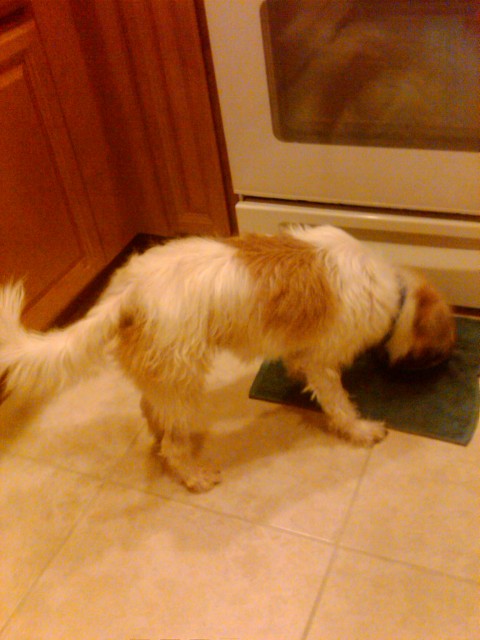 How do I groom my mixed breed terrier?
Question
Oliver
Hi Susan!
I recently rescued a wonderfu
How do I groom my mixed breed terrier?
Question
Oliver
Hi Susan!
I recently rescued a wonderfu
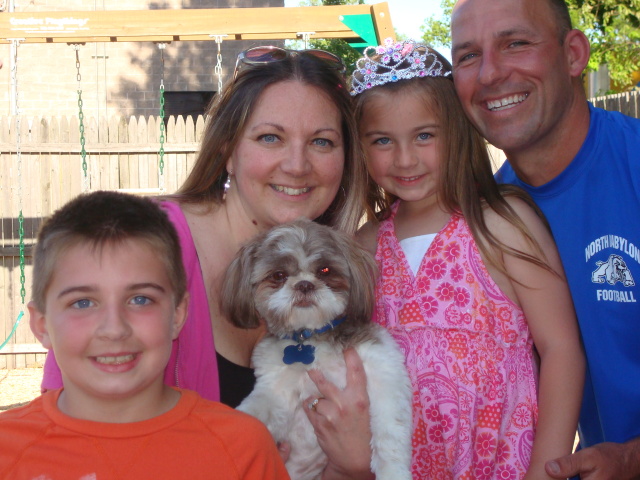 18month old sweet shih tzu starting to growl at me
Question
our family
Hi Valentina,
I have recently beco
18month old sweet shih tzu starting to growl at me
Question
our family
Hi Valentina,
I have recently beco
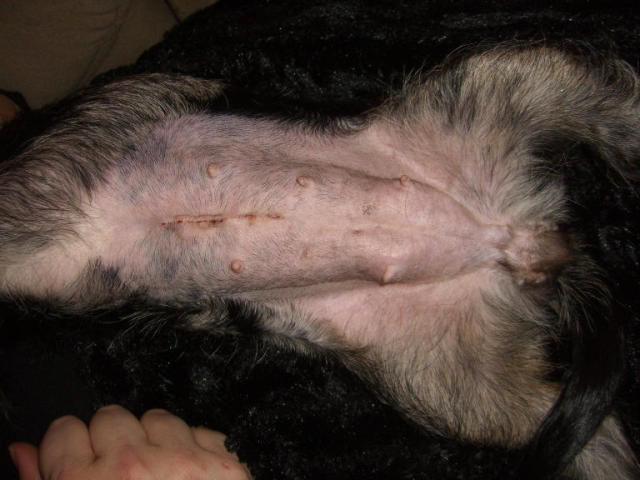 Dachshund spay - swollen mammaries
Question
Lilly
Hi Patti,
We took our 10 month old mini
Dachshund spay - swollen mammaries
Question
Lilly
Hi Patti,
We took our 10 month old mini
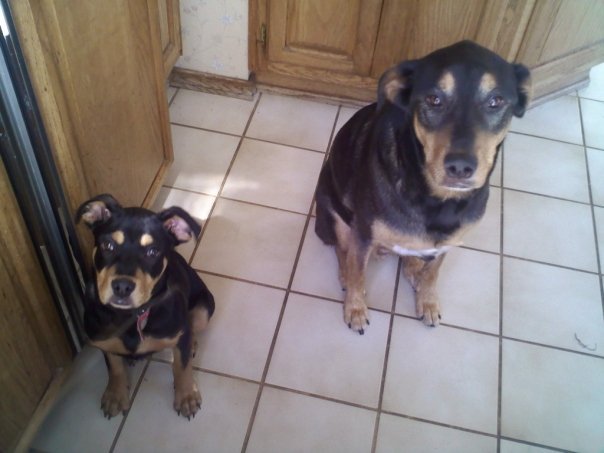 Dominant dog issues
Question
my 2 dogs
I have a 6 year old rottie/shepard m
Dominant dog issues
Question
my 2 dogs
I have a 6 year old rottie/shepard m
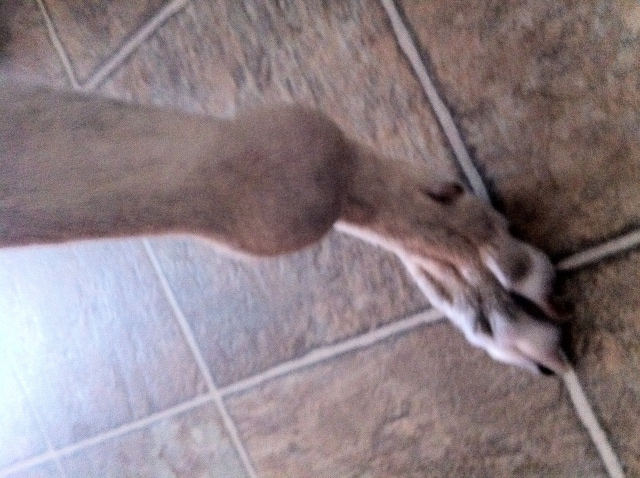 Growth on dogs right foreleg
Question
Foreleg 1 Foreleg 2
Hi Gary,
Our
Growth on dogs right foreleg
Question
Foreleg 1 Foreleg 2
Hi Gary,
Our